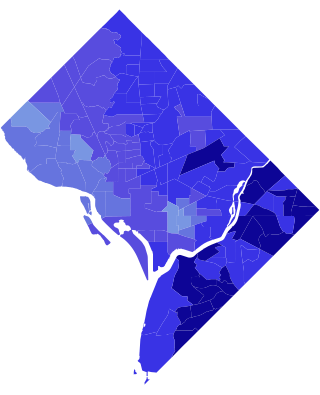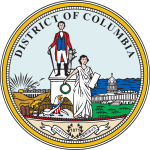
The 2006 South Carolina gubernatorial election took place on November 7, 2006. Incumbent Republican Governor Mark Sanford won re-election against Democratic State Senator Tommy Moore, becoming only the third Republican governor in South Carolina to win a second term. Sanford started the campaign with a double-digit edge over Moore and he maintained that lead to election day. During the campaign, Sanford's approval rating averaged in the mid-fifties. In Sanford's re-election victory, he also garnered 22% of the African American vote.

Florence Howard Pendleton was an American political activist who served as a shadow senator from the District of Columbia from 1991 to 2007.

Paul Eric Strauss is an American politician and attorney serving as the senior United States shadow senator from the District of Columbia since 1997. He succeeded Jesse Jackson, the first person to hold the elected position of a shadow senator for Washington, D.C. He is a member of the Democratic Party.

On November 7, 2006, Washington, D.C., held an election for its mayor. It determined the successor to two-term mayor Anthony A. Williams, who did not run for re-election. The Democratic primary was held on September 12. The winner of both was Adrian Fenty, the representative for Ward 4 on the D.C. Council. He took office on January 2, 2007, becoming the sixth directly elected mayor since the establishment of home rule in the District, and — at 35 — the youngest elected mayor of a major American city in U.S. history.

Michael Donald Brown is an American politician serving as the junior United States shadow senator from the District of Columbia, having served since 2007.

The 2018 United States Shadow Senator election in the District of Columbia took place on November 6, 2018, to elect a shadow member to the United States Senate to represent the District of Columbia. The member was only recognized by the District of Columbia and not officially sworn or seated by the United States Senate. Incumbent Mike Brown was re-elected to a third term.

On November 8, 2022, Washington, D.C., held an election for its mayor. Incumbent Democrat Muriel Bowser was elected to a third term. The Republican nominee, Stacia Hall, received 2,368 votes in the primary, and independent candidate Rodney "Red" Grant garnered 4,700 signatures to gain ballot access. Both appeared on the general election ballot along with Libertarian Party candidate Dennis Sobin. D.C. Statehood Green Party nominee Corren Brown did not appear on the general election ballot.

The 2020 United States Shadow Senator election in the District of Columbia took place on November 3, 2020, to elect a shadow member to the United States Senate to represent the District of Columbia. The member was only recognized by the District of Columbia and not officially sworn or seated by the United States Senate. Paul Strauss won election to a fifth term with the largest percentage and number of votes in his career.

On November 3, 2020, the District of Columbia held elections for several local and federal government offices. Its primary elections were held on June 2, 2020.

On November 3, 2020, the District of Columbia held a U.S. House of Representatives election for its shadow representative. Unlike its non-voting delegate, the shadow representative is only recognized by the district and is not officially sworn or seated.

The 2014 United States Shadow Senator election in the District of Columbia took place on November 4, 2014, to elect a shadow member to the United States Senate to represent the District of Columbia. The member was only recognized by the District of Columbia and not officially sworn or seated by the United States Senate. Incumbent Paul Strauss won his closest primary challenge against businessman Pete Ross and was easily elected to a fourth term.

The 2012 United States Shadow Senator election in the District of Columbia took place on November 6, 2012, to elect a shadow member to the United States Senate to represent the District of Columbia. The member was only recognized by the District of Columbia and not officially sworn or seated by the United States Senate. Incumbent Michael D. Brown was re-elected to a second term.

The 2000 United States Shadow Senator election in the District of Columbia took place on November 7, 2000, to elect a shadow member to the United States Senate to represent the District of Columbia. The member was only recognized by the District of Columbia and not officially sworn or seated by the United States Senate. Incumbent Shadow Senator Florence Pendleton won reelection to a third term with virtually no opposition.

The 1994 United States Shadow Senator election in the District of Columbia took place on November 8, 1994, to elect a shadow member to the United States Senate to represent the District of Columbia. The member was only recognized by the District of Columbia and not officially sworn or seated by the United States Senate. Incumbent Shadow Senator Florence Pendleton won reelection to a second term.

On November 3, 1992, the District of Columbia held a U.S. House of Representatives election for its shadow representative. Unlike its non-voting delegate, the shadow representative is only recognized by the district and is not officially sworn or seated. One-term incumbent and inaugural office-holder Charles Moreland ran for reelection and won.

The 1990 United States Shadow Senator election in the District of Columbia took place on November 6, 1990, to elect two shadow members to the United States Senate to represent the District of Columbia. The members were only recognized by the District of Columbia and not officially sworn or seated by the United States Senate.

On November 8, 2022, the District of Columbia held a U.S. House of Representatives election for its shadow representative. Unlike its non-voting delegate, the shadow representative is only recognized by the district and is not officially sworn or seated. Incumbent Shadow Representative Oye Owolewa was reelected to a second term.

The 2002 United States Shadow Senator election in the District of Columbia took place on November 5, 2002, to elect a shadow member to the United States Senate to represent the District of Columbia. The member was only recognized by the District of Columbia and was not officially sworn or seated by the United States Senate. Incumbent Shadow Senator Paul Strauss decisively won the primary against challenger Pete Ross and was reelected to a second term by a landslide.

The 2008 United States Shadow Senator election in the District of Columbia took place on November 4, 2008, to elect a shadow member to the United States Senate to represent the District of Columbia. The member was only recognized by the District of Columbia and not officially sworn or seated by the United States Senate.

The 2024 United States Shadow Senator election in the District of Columbia will take place on November 5, 2024, to elect a shadow member to the United States Senate to represent the District of Columbia. The member is only recognized by the District of Columbia and not officially sworn or seated by the U.S. Senate. Incumbent Mike Brown was re-elected to a third term in 2018.
















